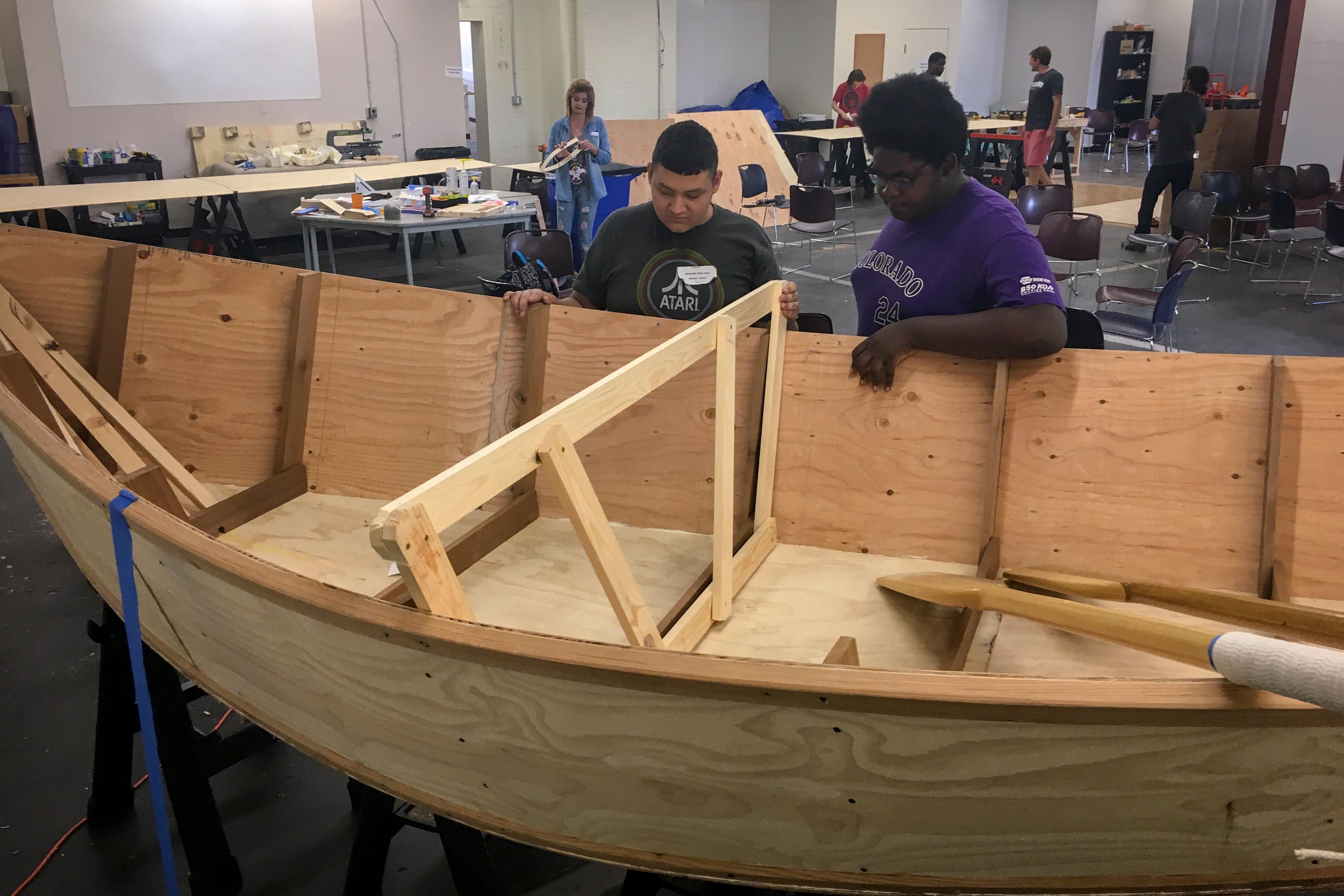

Students at the new 5280 High School near downtown Denver began their school year with a project.
Teacher Max Schwartz showed off a 10-foot wooden boat and told the students this is what they’ll be making — their own big boat.
“This is going to be the best boat,” exclaimed one student, to which another teacher replied, “OK, I wanna see that best boat.” In a few days this first-ever class of students was very busy, saws and hammers in action, building their creations. Once completed, students will take the school’s fleet of half of dozen boats out on nearby Sloan’s Lake to see just how seaworthy they are.

The 5280 school uses projects like this to teach innovation, problem solving and collaboration. At this new school, there’s also a constant focus on health, and for those in recovery from substance use problems, sobriety. For teacher Mario Sanchez, it’s all very non-traditional.
“We need the students to help us, and the staff needs to come together,” Sanchez said. “And we want to see if this school will float?”
How the school — which will focus on teen challenges and a new educational approach — will work is a key question for founder Melissa Mouton.
She was set to be a doctor, a pediatrician specializing in adolescents. Then Mouton met a student from a prominent Denver high school (whom she prefers to not name for fear of singling them out) who “was a former heroin user who had to drop out” in order to stay clean.
“It was a decision that he made that he needed to separate from his old friend group and get out of that drug culture,” Mouton said of the student’s choice to finish their education through homeschooling.
Mouton saw that as a choice the student shouldn’t have had to make. She wanted to create a hands-on learning environment, in a supportive culture, focused on health and wellness.
“We should have a school for kids in Denver who are making serious decisions about their health and their recovery,” Mouton said. “There should be a place that is safe and high-quality education environment for them to attend.”
Enrollment at 5280 High is at more than 100 students, mostly freshman. They’ll add a new class each year.


“There’s a huge demand,” for services for students in recovery — and a serious shortage of school options — said Dr. Paula Riggs, a professor of psychiatry and director of the Division of Substance Dependence at the University of Colorado’s School of Medicine.
“We have very good research that shows only about 10 percent of adolescents who could benefit from substance treatment receive it, so that is an enormous gap in treatment access and availability,” Riggs said.
She sees “an enormous need to increase access and availability of evidence-based effective treatment” and one way to meet that need is providing treatment “in school-based settings.”
Each day at 5280 starts and ends with wellness programs aimed at developing social and emotional skills. The students in recovery participate in the school’s Summit Program, where they discuss common challenges, emotional wellness and links between physical and mental health.
Jacob Zimmer, a 19-year-old recovery coach, struggled with drug and alcohol use in high school, but found help through a 12-step program. He said his job at 5280 is to “make sure kids feel comfortable coming back into school while maintaining sobriety and overall living a better life from what they were doing while using.”

Zimmer is working with 14-year-old Jakob Landers, a freshman in a floppy hat and Bart Simpson t-shirt. Landers started drinking when he was 12. That lead to pot, and later, percocet. “And then I started doing a lot of acid and then I just went into a whole psychedelic phase, I guess,” Landers said. “I just started getting, like, really sad and I just started hating myself, I guess.”
After an overdose, he went into treatment. Now, seven months sober, Landers said he’s ready for a school-based program that’ll help him stay strong, something he thinks would have been tough at a traditional high school.
“It’s just kind of cool to have that accountability with other sober people,” Landers said.
There’s peer support where others can tell a student “yeah, you shouldn’t be doing this,” Landers offered as an example. “You should be hanging out with this crew and stuff like that.”
Remember the boats that the students are working on? It’s more than a project, it turns out it is also a metaphor.
Landers’ teachers explained that B.O.A.T stands for ‘Be present, Open-minded, Authentic, Together.’ Landers likes the idea and said it’s “a good way of kind of explaining things, of how we want the school to run.”
“I just really like that metaphor, puts it all into one word,” Landers said.









